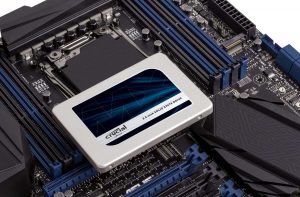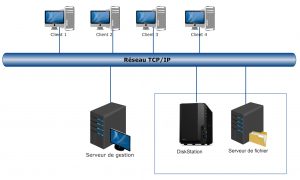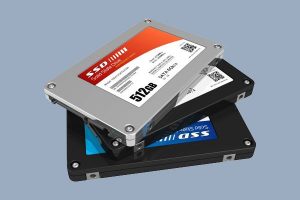A hard disk (HDD) is a magnetic rotating disk mass storage device used mainly in computers. But also in digital music players, camcorders, home DVD players/recorders, video game consoles, etc. The hard disk is one of the main components of a computer. In this article, we will discuss the difference between HDD and SSD.
Thus the main role of the hard disk is to store data permanently, unlike random access memory, which is erased every time the computer is restarted, which is why hard disks are sometimes called mass storage.
HDD (Hard Disk Drive)
The technologies behind HDDs are then well known and well tested. HDDs have been around for over 60 years, steadily increasing their storage capacity and decreasing their physical size. They rely on rotating disks, or platters, to read and write data.
However, HDD drives consist of one or more magnetically sensitive platters. An actuator arm with a read/write head on it for each tray and a motor to turn the trays and move the arms. So there is also an I/O controller and firmware that tells the hardware what to do and communicates with the rest of the system.
Each tray is therefore organized in concentric circles called tracks. The tracks are divided into logical units called sectors. Each track and sector number provides a unique address that can be used to organize and locate data. The data is written to the nearest available area. There is an algorithm that processes the data before it is written, allowing the firmware to detect and correct errors.
The platters rotate at predefined speeds (4200 rpm to 7200 rpm for consumer computers). These speeds are therefore correlated with the read/write rates. The higher the preset speed, the faster the hard disk can read and write data.
The advantages of HDDs are that they are a proven technology and are often cheaper than SSDs for the same amount of storage. Nowadays, they are also available with more storage space than SSDs.

SSD (Solid State Drive)
An SSD therefore uses flash memory to provide superior performance and durability. However, they can be considered as big USB drives, they use the same basic technology.
The technology of SSDs, is therefore a kind of flash memory. At the lowest level, floating gate transistors register a charge (or lack thereof) to store data.
SSDs then offer faster load times for video games, applications and movies.
However, because of the technology they use, SSDs are lighter and better able to withstand movement and drops. Finally, SSDs consume less power, allowing computers to operate at lower temperatures.

The difference between HDD and SSD
| HDD | SSD |
| Inexpensive | Very expensive |
| Not fast | Faster |
| Less sustainable | More sustainable |
| Consumes more electrical energy | Uses less electrical energy |
| Rotations and clicks are audible and can be heard | No sound produced due to lack of moving parts |
| Very large storage capacity | Limited in storage capacity |
Nowadays, SSDs are saturating the market. So if you are looking for a hard drive to store a large amount of data and you are limited by a budget, the HDD is a good choice for you. Finally, if you want to run video games or large applications on your system, use the SSD.



